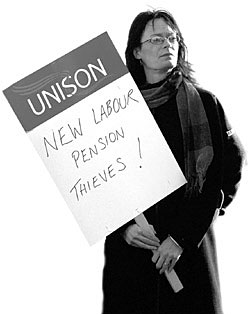Union dues
 Next Tuesday will see what's being billed as the biggest industrial action in the UK since the General Strike of 1926 with perhaps a million public sector workers (including yours truly) coming out in defence of their pensions. Perhaps the most prominent union in the campaign has been Unison. It would have looked pretty strange if on the one hand they had been at the forefront of a camapign against the incumbent Labour government, while on the other they had been campaigning for them in the forthcoming local elections. Strange, but not unexpected given the track record of trade unions and their relationships with Labour. Fortunately, however, somebody has seen sense: the union confirmed today that it had suspended camapaigning for the party until the dispute is resolved.
Next Tuesday will see what's being billed as the biggest industrial action in the UK since the General Strike of 1926 with perhaps a million public sector workers (including yours truly) coming out in defence of their pensions. Perhaps the most prominent union in the campaign has been Unison. It would have looked pretty strange if on the one hand they had been at the forefront of a camapign against the incumbent Labour government, while on the other they had been campaigning for them in the forthcoming local elections. Strange, but not unexpected given the track record of trade unions and their relationships with Labour. Fortunately, however, somebody has seen sense: the union confirmed today that it had suspended camapaigning for the party until the dispute is resolved.This is great news. Given the much hyped resurgence of the Tories, Labour have got to be worried about their chances in this election. Losing the support of the country's largest union will hopefully put the wind up them, which after all is surely what unions are for. (Not that you'd believe it from the guff they sent me with my application pack which promised cheap flowers and priority car hire in exchange for membership, as if I was signing up to a loyalty card.)
All being well, this will add even greater distance to the growing chasm between the Labour Party and union bureaucracies. For too long the leadership of the union movement has had its collective head stuffed up Labour's rectum. The last few years have seen glimmers of light and hints of a genuine break, notably the RMT's decision to allow branches to affliate to other political parties. Unfortunately, I think this can only go so far. Modern trade unions, with their emphasis on negotiating as "representatives" of their members can serve as a buffer between workers and their bosses, an effect exacerbated by the tendency for union leaders to become immersed in the same murky waters our political masters swim through. Nevertheless, in lieu of any organisation capable of waging the class war more effectively, I think there is a compelling case for critical engagement. Who else is going to fight to make sure we get to retire before we die?
Hat-tip: Lenny.
File Under: Labour, News, Pensions, Politics, Union, UK



















<< Home